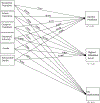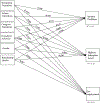Developmental effects of childhood household adversity, transitions, and relationship quality on adult outcomes of socioeconomic status: Effects of substantiated child maltreatment
- PMID: 29407855
- PMCID: PMC6134210
- DOI: 10.1016/j.chiabu.2018.01.031
Developmental effects of childhood household adversity, transitions, and relationship quality on adult outcomes of socioeconomic status: Effects of substantiated child maltreatment
Abstract
The degree to which child maltreatment interacts with other household adversities to exacerbate risk for poor adult socioeconomic outcomes is uncertain. Moreover, the effects of residential, school, and caregiver transitions during childhood on adult outcomes are not well understood. This study examined the relation between household adversity and transitions in childhood with adult income problems, education, and unemployment in individuals with or without a childhood maltreatment history. The potential protective role of positive relationship quality in buffering these risk relationships was also tested. Data were from the Lehigh Longitudinal Study (n = 457), where subjects were assessed at preschool, elementary, adolescent, and adult ages. Multiple group path analysis tested the relationships between childhood household adversity; residential, school, and caregiver transitions; and adult socioeconomic outcomes for each group. Caregiver relationship quality was included as a moderator, and gender as a covariate. Household adversity was negatively associated with education level and positively associated with income problems for non-maltreated children only. For both groups, residential transitions was negatively associated with education level and caregiver transitions was positively associated with unemployment problems. Relationship quality was positively associated with education level only for non-maltreated children. For children who did not experience maltreatment, reducing exposure to household adversity is an important goal for prevention. Reducing exposure to child maltreatment for all children remains an important public health priority. Results underscore the need for programs and policies that promote stable relationships and environments.
Keywords: Child maltreatment; Demographic transition; Longitudinal study; Parent child relationship; Residential mobility; Socioeconomic status.
Copyright © 2018 Elsevier Ltd. All rights reserved.
Figures
Similar articles
-
The co-occurrence of adverse childhood experiences among children investigated for child maltreatment: A latent class analysis.Child Abuse Negl. 2019 Jan;87:18-27. doi: 10.1016/j.chiabu.2017.11.010. Epub 2017 Nov 22. Child Abuse Negl. 2019. PMID: 29174715 Free PMC article.
-
The prevalence and impact of child maltreatment and other types of victimization in the UK: findings from a population survey of caregivers, children and young people and young adults.Child Abuse Negl. 2013 Oct;37(10):801-13. doi: 10.1016/j.chiabu.2013.02.004. Epub 2013 Mar 21. Child Abuse Negl. 2013. PMID: 23522961
-
Development of trauma symptoms following adversity in childhood: The moderating role of protective factors.Child Abuse Negl. 2020 Mar;101:104375. doi: 10.1016/j.chiabu.2020.104375. Epub 2020 Jan 31. Child Abuse Negl. 2020. PMID: 32014798
-
The association between child maltreatment and adult poverty - A systematic review of longitudinal research.Child Abuse Negl. 2018 Mar;77:121-133. doi: 10.1016/j.chiabu.2017.12.022. Epub 2018 Jan 12. Child Abuse Negl. 2018. PMID: 29346067
-
Childhood Maltreatment and Educational Outcomes.Trauma Violence Abuse. 2015 Oct;16(4):418-37. doi: 10.1177/1524838014537908. Epub 2014 Jun 11. Trauma Violence Abuse. 2015. PMID: 24920354 Review.
Cited by
-
Child Maltreatment, Youth Violence, Intimate Partner Violence, and Elder Mistreatment: A Review and Theoretical Analysis of Research on Violence Across the Life Course.Trauma Violence Abuse. 2022 Jan;23(1):314-328. doi: 10.1177/1524838020939119. Epub 2020 Jul 29. Trauma Violence Abuse. 2022. PMID: 32723166 Free PMC article. Review.
-
Child Abuse and Neglect: Breaking the Intergenerational Link.Am J Public Health. 2018 Sep;108(9):1117-1118. doi: 10.2105/AJPH.2018.304636. Am J Public Health. 2018. PMID: 30088995 Free PMC article. No abstract available.
-
Relationship Quality and Mental Health Implications for Adolescents during the COVID-19 Pandemic: a Longitudinal Study.J Child Fam Stud. 2023;32(2):544-554. doi: 10.1007/s10826-022-02519-3. Epub 2023 Jan 21. J Child Fam Stud. 2023. PMID: 36714376 Free PMC article.
-
Childhood maltreatment and later stressful life events as predictors of depression: A test of the stress sensitization hypothesis.Psychol Violence. 2020 Sep;10(5):493-500. doi: 10.1037/vio0000303. Epub 2020 Jun 11. Psychol Violence. 2020. PMID: 35387359 Free PMC article.
-
Factors that Influence Chinese Parents' Intentions to Use Physical Violence to Discipline Their Preschool Children.Int J Environ Res Public Health. 2020 Mar 10;17(5):1787. doi: 10.3390/ijerph17051787. Int J Environ Res Public Health. 2020. PMID: 32164156 Free PMC article.
References
-
- Aiken LS, & West SG (1991). Multiple regression: Testing and interpreting interactions. Thousand Oaks, CA: Sage.
-
- Bird K (2007). The intergenerational transmission of poverty: An overview. Chronic Poverty Research Centre (CPRC) working paper 99. London: Overseas Development Institute.
-
- Conger RD, Conger KJ, Elder GH, Lorenz FO, Simons RL, & Whitbeck LB (1992). A family process model of economic hardship and adjustment of early adolescent boys. Child Development, 63(3), 526–541. - PubMed
Publication types
MeSH terms
Grants and funding
LinkOut - more resources
Full Text Sources
Other Literature Sources
Medical




